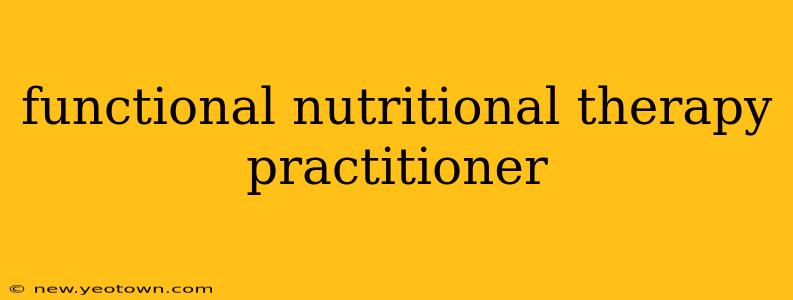The world of healthcare is evolving, moving beyond a purely symptom-based approach to one that delves deeper into the root causes of illness. At the forefront of this shift are Functional Nutritional Therapy Practitioners (FNTPs). But what exactly is an FNTP, and how can they help you achieve optimal health? Let's embark on a journey to uncover the intricacies of this holistic healthcare profession.
My name is Sarah, and I've spent the last decade immersed in the world of nutrition and wellness. I've witnessed firsthand the transformative power of a functional approach, and I'm excited to share my insights with you.
What is a Functional Nutritional Therapy Practitioner (FNTP)?
An FNTP isn't your average nutritionist. They're trained to look beyond simple dietary recommendations, investigating the underlying imbalances that contribute to health problems. Instead of treating symptoms, they focus on identifying and addressing the root causes of illness. Think of it as detective work for your body, meticulously piecing together the puzzle of your health. They consider factors such as genetics, lifestyle, environment, and gut health to create a personalized plan tailored specifically to your unique needs.
This holistic approach sets FNTPs apart. They don't just tell you to "eat more vegetables"; they delve into why your body might not be absorbing nutrients properly, or why certain foods might be triggering inflammation. They utilize a range of tools and techniques to assess your individual needs, including blood tests, stool analysis, and lifestyle assessments.
What Does a Functional Nutritional Therapy Practitioner Do?
FNTPs employ a multifaceted approach, often incorporating the following:
-
Detailed Assessment: FNTPs conduct thorough interviews to understand your medical history, lifestyle, and dietary habits. They might also utilize specialized testing to evaluate nutrient levels, gut health, and other potential imbalances.
-
Personalized Plans: Unlike generic dietary advice, FNTPs develop customized plans that address your specific needs and goals. This might involve dietary modifications, supplement recommendations, and lifestyle changes.
-
Education and Empowerment: FNTPs educate their clients on the "why" behind their recommendations, empowering them to take control of their health. They foster a collaborative relationship, working alongside their clients to achieve sustainable, long-term results.
-
Ongoing Support: The journey to optimal health is not a sprint but a marathon. FNTPs provide ongoing support, monitoring progress, and adjusting plans as needed.
What Conditions Do Functional Nutritional Therapy Practitioners Treat?
FNTPs work with a wide range of health concerns, including but not limited to:
- Digestive Issues: Irritable bowel syndrome (IBS), Crohn's disease, ulcerative colitis, leaky gut syndrome.
- Autoimmune Disorders: Hashimoto's thyroiditis, rheumatoid arthritis, lupus.
- Metabolic Conditions: Diabetes, insulin resistance, metabolic syndrome.
- Mental Health: Anxiety, depression, ADHD.
- Hormonal Imbalances: PCOS, PMS, menopause.
What is the Difference Between an FNTP and a Registered Dietitian (RD)?
While both FNTPs and RDs provide nutrition advice, their training and scope of practice differ. RDs focus primarily on the nutritional aspects of food and diet, whereas FNTPs take a broader, more holistic approach, incorporating factors like lifestyle, genetics, and environmental influences. Think of it as the difference between treating a symptom (RD) and addressing the root cause (FNTP). Both professions can be incredibly valuable depending on individual needs.
How Do I Find a Qualified Functional Nutritional Therapy Practitioner?
Finding a qualified FNTP is crucial. Look for practitioners who are certified by a reputable organization, and always check their credentials and experience. Many FNTPs will have testimonials from satisfied clients, and you should seek recommendations from trusted healthcare professionals.
How Much Does it Cost to See an FNTP?
The cost of seeing an FNTP can vary widely depending on location, experience, and the types of services provided. It's advisable to contact potential practitioners directly to inquire about their fees and payment options.
In conclusion, functional nutritional therapy offers a unique and powerful approach to health and wellness. By addressing the root causes of illness, FNTPs help individuals achieve lasting improvements in their overall health and well-being. If you're seeking a more holistic and personalized approach to your health journey, considering an FNTP might be the key to unlocking your body's full potential.

